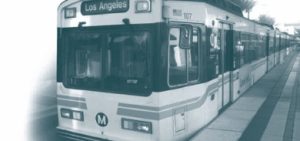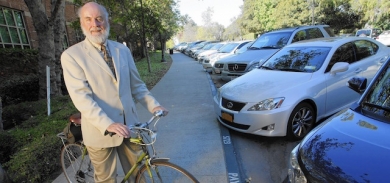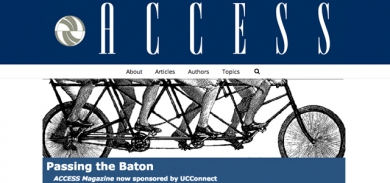Latest Issue Of ACCESS Magazine Now Available Fall ACCESS Magazine Looks at Travel Behavior, Transit Oriented Development

If car drivers knew more about the impacts of their travel decisions, would they modify them, hop on a bike or skip a trip? Does developing housing near rail stations (Transit Oriented Development) change travel habits or decrease car ownership? And, how can groups with opposing political views find common ground and move forward?
These questions and more are the subject matter of the Fall issue of ACCESS Magazine, edited by Donald Shoup, Distinguished Professor of Urban Planning, Emeritus, at the UCLA Luskin School of Public Affairs.
Fall 2015 Contents:
Quantified Traveler: Travel Feedback Meets the Cloud to Change Behavior
Raja Sengupta and Joan L. Walker
Most people are aware that car emissions harm the environment, but they continue to drive anyway. What would it take for people to drive less and use other means of travel more? Authors Sengupta and Walker try to get people to walk, bike, and take transit more through the use of a new program, Quantified Traveler. With this program, respondents were able to track their travel behavior and compare it with their peers and the national average. The newfound awareness of individual habits, especially in comparison to others, lead to driving distances dropping and respondents showing an actual change in their attitude towards travel.
Unraveling the Modal Impacts of Bikesharing
Susan Shaheen and Elliot Martin
You’ve probably seen them in most major cities: bikes readily available for checkout, used by commuters and tourists alike. But how are bikesharing programs influencing other forms of travel? Are you more likely to take the bus if you also share a bike? Shaheen and Martin surveyed bikesharers in four major cities to see how their travel behavior changed over the course of time. They discovered that, aside from biking more, bikesharers also drive less and own fewer vehicles. In addition, bikesharing serves as an important first- and last-mile connector for public transit.
Does Transit-Oriented Development Need the Transit?
Developing housing near rail stations is expensive, but it’s supposed to encourage people to walk, bike, and take transit. Does it? Chatman explores the effect of rail on people’s travel habits. When all other factors were considered (bus access, job and population density, and housing type, etc.), rail access had no effect on auto ownership. What did have an effect? Parking availability.
Life-Cycle Impacts of Transit-Oriented Development
Matthew J. Nahlik and Mikhail Chester
There is little research on the impact of TODs on the environment and household costs. There is even less research on the impacts of building TODs. For that reason, Nahlik and Chester developed an assessment to measure these impacts. The authors evaluated redevelopment around LA Metro’s Gold and Orange lines, including emissions from the rehabilitation of nearby buildings, changes in household energy use, and reductions in automobile use as households shift to alternate travel modes. The result was that proposed developments could reduce GHG emissions by over 35 percent compared with business-as-usual developments. The upfront costs to construct these TODs would be offset by emission reductions over time from residents who are able to change their behaviors and break away from car-dependent habits.
Changing Lanes
Joseph F. DiMento and Cliff Ellis
After World War II, states were provided with a 90 percent federal match for the construction of freeways meant to penetrate urban cores, clear out slums, and renew central business districts. By the late 1960s, however, this love affair with the freeway ended as citizen protests forced public officials to reassess the effects of their intruding highways. “Changing Lanes,” based on the book by the same name, explores the controversy, racism, and the legal battles associated with some of these urban highways. As several cities plan on demolishing their urban highways for other creative developments, DiMento and Ellis examine possible opportunities for them, including a chance for more public transit.
THE ACCESS ALMANAC: Common Ground
We’ve all been in an argument where neither side seems to be listening to the other. We start trying to “win” instead of figuring out a solution that works. This is even truer when dealing with people who ideologically opposed to our own views. So how do we move forward? Especially when the political process is involved?
Karen Trapenberg Frick emphasizes the importance of finding any areas of common ground in order to move forward. In the course of the author’s political planning research, there were always areas where both sides of an argument could agree. Whether it was electric vehicles not paying their fair share of transportation costs, or questioning the wisdom of running costly rail lines in low-density areas, there was always a common ground to be found if participants considered their opponents as legitimate adversaries rather than as enemies unworthy of engagement.
For more information about ACCESS and to view the Fall Edition please visit: www.accessmagazine.org
ACCESS Magazine is published by the University California Center on Economic Competitiveness in Transportation (UCONNECT), and is housed at UCLA’s Luskin School of Public Affairs and the Institute of Transportation Studies.


















